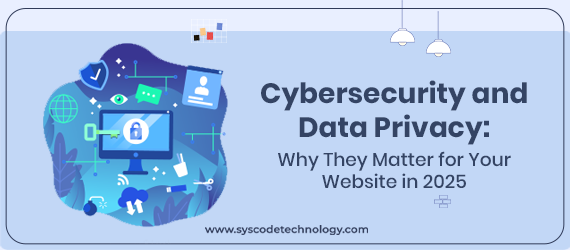Cybersecurity and Data Privacy: Why They Matter for Your Website in 2025

17/10/25
Category : Cybersecurity
Why Cybersecurity is Crucial for Your Website
Increasing Cyber Threats
- Cybercriminals are constantly evolving their techniques to exploit vulnerabilities in websites. From data breaches to phishing attacks and ransomware, businesses face a range of potential threats that could compromise user data, damage reputation, and lead to significant financial losses. By strengthening your website’s cybersecurity, you can minimize the risk of these attacks.
Building User Trust
- Trust is a critical factor in online transactions. Users are more likely to engage with your website if they feel their personal data is protected. A website that employs strong cybersecurity practices, such as encryption and secure payment systems, gives users confidence that their information is safe.
Legal Requirements and Compliance
- With the rise of data protection laws like the General Data Protection Regulation (GDPR) and the California Consumer Privacy Act (CCPA), businesses must comply with strict data privacy regulations. Failure to adhere to these laws can result in hefty fines and damage to your reputation. Ensuring your website is compliant will help avoid legal complications.
Key Cybersecurity Measures for Your Website
SSL Encryption
- SSL (Secure Socket Layer) encryption ensures that data transmitted between a user’s browser and your website is encrypted and secure. Websites with SSL certificates (indicated by "https://" in the URL) provide an added layer of protection, making it harder for hackers to intercept sensitive information.
Regular Software Updates
- Keeping your website’s software, plugins, and content management system (CMS) up to date is crucial for patching security vulnerabilities. Cybercriminals often exploit outdated software to gain unauthorized access. Regular updates ensure that you are protected against the latest threats.
Firewalls and Intrusion Detection Systems (IDS)
- Firewalls act as a barrier between your website and potential threats from the internet. Intrusion detection systems (IDS) help monitor traffic for suspicious activity, alerting you to potential attacks before they cause harm.
Multi-Factor Authentication (MFA)
- Implementing multi-factor authentication for your website’s login system can significantly reduce the risk of unauthorized access. MFA requires users to provide additional verification, such as a code sent to their phone, ensuring that only legitimate users can access their accounts.
Backups and Disaster Recovery Plans
- Regularly backing up your website ensures that you have a secure copy of your data in case of a cyberattack or system failure. A solid disaster recovery plan will help you quickly recover from any data loss, minimizing downtime and disruption.
Why Data Privacy Matters
Consumer Awareness and Expectations
- Consumers are becoming increasingly aware of how their personal data is used and shared. According to recent studies, a growing number of users expect businesses to take their privacy seriously. Websites that fail to protect user data risk losing customer trust and loyalty.
Data Breaches Can Have Severe Consequences
- Data breaches expose sensitive customer information, such as names, emails, credit card details, and even passwords. The aftermath of a data breach can be disastrous, leading to legal action, loss of business, and a damaged reputation.
Transparency and Control
- Being transparent about how you collect, use, and store customer data is essential for building trust. Websites should provide users with easy-to-understand privacy policies and give them control over their data, including the ability to opt out of data collection practices if they choose.
How to Improve Data Privacy on Your Website
Data Encryption
- Just as SSL encryption secures data during transmission, encrypting stored data ensures that even if hackers manage to gain access to your server, the information they steal will be unreadable.
Limit Data Collection
- Only collect the data you absolutely need to deliver your services. Minimizing the amount of personal information you gather reduces the risk of exposing sensitive data in case of a breach.
Clear Privacy Policies
- Have a clear and concise privacy policy that explains what data you collect, how you use it, and how long you retain it. This transparency is key to building user trust and complying with privacy regulations.
Regular Audits
- Conduct regular security audits and vulnerability assessments to ensure your website is protected against new threats. Regular reviews of your data privacy policies will help ensure compliance with evolving laws and regulations.
Conclusion: Prioritize Cybersecurity and Data Privacy for Long-Term Success
Cybersecurity and data privacy are no longer optional for websites—they are integral to maintaining a trusted, secure online presence. By implementing strong security measures, protecting sensitive user data, and complying with privacy regulations, businesses can safeguard their reputation, foster trust, and ensure long-term success in an increasingly digital world.
Ready to Secure Your Website?
Let us help you strengthen your website’s cybersecurity and protect your users’ data. Contact us today or visit our website at syscode.in to learn more about our solutions!
Follow Us on Social Media:
- Instagram: @syscode_technology

 Click to chat
Click to chat